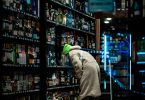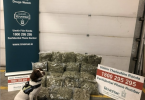‘Rounds’ tradition responsible for 1 in 3 drinking more than intended

One-third of UK adults have reported drinking more than initially expected because they were encouraged to do so by others (35%) or because they didn’t want to be impolite and refuse a drink someone had offered them (34%).
It found that one-third (35%) have reported drinking more than initially expected because they were encouraged to do so by others (35%) or because they didn’t want to be impolite and refuse a drink someone had offered them (34%).
The Drinkaware Monitor 2019 surveyed three representative samples of UK, Scottish and Welsh adults aged 18-85 online between 11th and 18th July last year to investigate drinking behaviours, attitudes and experiences of peer pressure to drink (or to drink more than initially intended).
The survey also found that 81% of UK adults drink alcohol at least once a year — a statistically significant decrease on the Drinkaware Monitor’s 2018 findings of 84% while one-quarter (26%) of the total UK adult population fell into the ‘increasing risk’ category and one in seven (14%) were defined as ‘higher risk’ drinkers.
The main objectives of this research were to provide an overview of adults’ drinking behaviour in the UK (including how frequently and how much they’re drinking) and to explore attitudes to and experiences of peer pressure (ie pressure from others) to drink alcohol or to drink more than initially intended.
These findings suggest that implied pressure rather than overt pressure is more likely to lead to higher than intended alcohol consumption.
Influencing others to drink more
When thinking about ways in which they may have influenced others to drink more, one in five UK adults who drink reported having encouraged someone to drink more alcohol after they said they didn’t want to (21%) or gave someone an alcoholic drink or topped up their glass without asking first (19%).
Measures to avoid or mitigate pressure to drink alcohol
Over a third of drinkers (37%) report having ‘nursed’ their drink to avoid pressure to have another. A third of drinkers (32%) have spoken out for themselves when they’ve been under pressure to drink alcohol and three in 10 (28%) have spoken out on behalf of someone else when they have been under pressure to drink alcohol.
One in five (20%) have made an excuse to avoid drinking an alcoholic drink instead of saying “No”.








